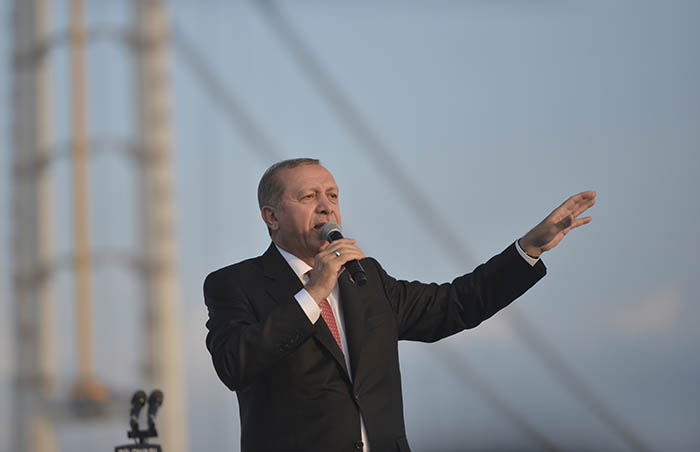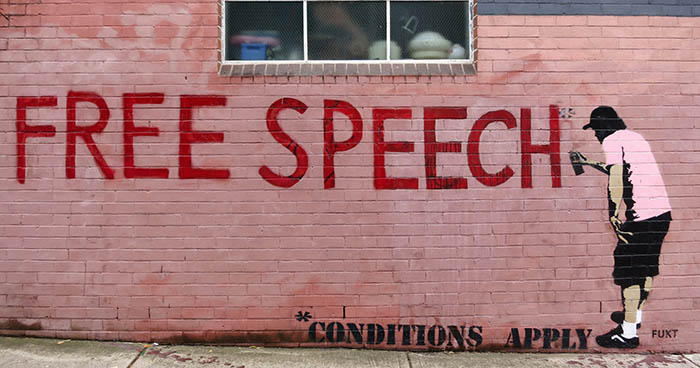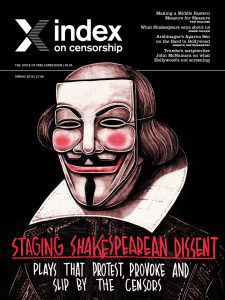20 Mar 2017 | News and features, Turkey, Turkey Uncensored
[vc_row full_width=”stretch_row_content”][vc_column][vc_single_image image=”86224″ img_size=”full” alignment=”center”][/vc_column][/vc_row][vc_row][vc_column][vc_column_text]Semih Poroy left the Istanbul University Law School to devote himself to the world of cartoons. His first works appeared in Akbaba (The Condor), Turkey’s oldest humour magazine, in 1975.
In 1988 he became a full-time member of the daily Cumhuriyet, to which he had been submitting as a freelancer since 1977. His comic strip Harbi has been running in this newspaper since 1989. For the last ten years he has been drawing the full-page Feklavye, a satire of the literary world, for Cumhuriyet’s book supplement.
In addition to many articles on cartoons and humour published in art and culture periodicals, Poroy has five published cartoon collections (the last ones in 2008: Feklavye and Ohne Worte).
Poroy was elected as the chairman of the Cartoonists Society of Turkey in 1984 at the national cartoonists congress.[/vc_column_text][/vc_column][/vc_row][vc_row][vc_column][vc_column_text]

Turkey Uncensored is an Index on Censorship project to publish a series of articles from censored Turkish writers, artists and translators.
[/vc_column_text][/vc_column][/vc_row]
17 Mar 2017 | Academic Freedom, Digital Freedom, News and features
[vc_row][vc_column][vc_column_text]
Many universities pay lip service to freedom of speech on campus, but actions often tell a different story. In an effort to limit insult and offence, universities also limit freedom of expression. Spiked’s survey of British universities examines the policies and actions of faculty and students and ranks them using a traffic-light-themed system.
A ranking of “red” means that the university in question has banned and actively censored ideas on campus, “amber” signifies that it as chilled free speech through intervention and “green” indicates that the university has a hands-off approach to free speech. Over the last three years, the Spiked’s analysis has seen the steady decline of free speech on campus.
Here are just three examples from the last few weeks.
Lincoln University Conservative Society censored for criticising state of free speech on campus
The Lincoln University Conservative Society has been suspended from using social media by the Lincoln Student Union after publishing tweets that highlighted the university’s lack of free speech.
“Due to SU orders this Twitter account will no longer be active. We hope to return on 1st May. Sorry for any inconvenience,” the Conservative Society tweeted after a students’ union disciplinary hearing found that two tweets by the society brought the university into “disrepute.”
One tweet complained about a questionnaire those who wish to run in student union elections are required to submit. The other included a screenshot of a Spiked article which gave Lincoln the worst possible Free Speech University Ranking. According to Spiked, the university administration has a better ranking and therefore less restrictive free speech policies than the students’ union. The union’s policies allow them to restrict what they deem to be offensive, racist or fascist speech, and ban speakers who may draw controversy as part of their Safe Campus policy.
This is not the first time the students’ union has been criticised for violating students’ right to free speech. In 2016 it has banned use of the social media app Yik Yak from campus. The app, which allows students to post anonymous comments based on location, was made unavailable on the university’s wifi networks because it “caused much distress to a number of students”.
After the decision to suspend the Conservative Society’s Twitter account, , the union published a statement expressing their support and dedication to free speech on campus.
“Freedom of speech is a fundamental value of the Students’ Union,” it said. “The SU is built on a foundation where students can express opinions and ideas freely within the law.”
A spokesperson for the Conservative Society told The Lincolnite that the decisions were “misguided and disproportionate”.
Karl McCartney, MP for Lincoln, called the shutdown “intolerant,” “totalitarian,” and like “something out of the Soviet Union or North Korea”.
Tommy Robinson unwelcome at Oxford Brookes University
Ex-English Defence League leader Tommy Robinson was due to speak at Oxford Brookes University in February. Following an outcry from members of the student body, the university’s student union refused approval of the event, disallowing the right-wing activist to speak on campus.
Robinson, who is also at the helm of the anti-Islamist group Pegida UK, had been invited to speak at the university by an anti-extremism student group. The opposition to Robinson’s appearance on campus was strong enough that the police warned it posed a “public disorder” risk.
Accusations of Robinson supporting fascism and white supremacy spread throughout the university campus. Aspiring protesters launched a petition claiming that “regardless of his official departure from the EDL in 2013, Robinson has built his career on Islamophobic, racist speech and violence”.
The liberal student organisation that originally invited Robinson to speak did so in an effort to combat extremism through open dialogue.
Oxford Brookes University places no significant restrictions on free speech, but its students’ union employs a No Platform policy for those it deems to be fascist or racist, as well as a de facto ban on sexist expression.
Spiked gives Oxford Brookes an overall rating of amber, a combination of a green rating for the university and a red rating for the students’ union.
Cardiff Metropolitan University accused of policing speech in the name of equality
Cardiff Metropolitan University is attempting to “promote an atmosphere in which all students and staff feel valued”. In doing so, the university has created a Code of Practice on using Inclusive Language that enforces acceptable terminology throughout its academic programmes and campus.
The code offers “a few suggestions” – a list of 34 words and phrases to avoid and what to replace them with. If “this Code is not adhered to” disciplinary procedures can be taken against both staff and students.
Some of these suggestions include avoiding assumptions and generalisations based on stereotypes or norms from one’s own cultural background, using gender-neutral language, abstaining from using terms which might be regarded as patronising or pitying and using language which embraces cultural diversity.
On its “gender-neutral” terms checklist, the university recommends replacing the expression “right-hand man” with “chief assistant,” using “fairness, good humour, or sense of fair play” in place of “sportsmanship,” saying “artificial, manufactured, or synthetic” instead of “manmade” and calling adult females “women” instead of “girls”.
The code also states: “These days the terms ‘homosexual’ and ‘heterosexual’ seem laden with the values of a previous time. Referring to ‘same-sex’ and ‘other-sex’ relationships is a good option.”
Spiked has given Cardiff Metropolitan University an amber rating as it places restrictions on “offensive comments or gestures” and “jokes,” while also urging students to police their speech and avoid non-inclusive words. The students’ union has a rating of red due to its no platform policy, which bans racists, sexists and homophobes from the campus.
[/vc_column_text][/vc_column][/vc_row][vc_row][vc_column][vc_basic_grid post_type=”post” max_items=”4″ element_width=”6″ grid_id=”vc_gid:1489746234747-41452242-9ad6-6″ taxonomies=”8843″][/vc_column][/vc_row]
16 Mar 2017 | Events
[vc_row][vc_column][vc_column_text]
As freedom of speech in the arts, journalism and other mediums face significant challenges today, this event will explore the historic power of the arts in challenging power and promoting free speech.
Using the prism of Shakespeare, we will consider the various ways his work has been used throughout the centuries to channel dissent or used as propaganda and how the arts allow for greater freedoms of speech in our societies in the UK and US today. In partnership with Index on Censorship, this event will feature readings by 2016 Forward Prize winner and Trinidadian-British poet Vahni Capildeo and a panel discussion with renowned theatre director Dominic Dromgoole. For journalists, academics and students, this is truly an event not to be missed.
This program is part of Shakespeare Lives, a global program celebrating the continuing resonance of Shakespeare around the world led by the British Council and the GREAT Britain Campaign. The global program officially ended in 2016, but some activities will continue in the USA and worldwide in 2017.
This event is part of the Pen America World Voices Festival[/vc_column_text][vc_column_text]
When: Tuesday 2 May 2017 7:30-9 PM
Where: Roulette, 509 Atlantic Ave, Brooklyn, New York 11217 (map)
Tickets: $10 from Pen America World Voices Festival site
[/vc_column_text][/vc_column][/vc_row]
16 Mar 2017 | News and features, Turkey, Turkey Uncensored
[vc_row][vc_column][vc_column_text]
It took me three tries to watch the video, which has since been removed from YouTube by the user. The first pass was simply because it was one of the most popular videos during the latest war of words Europe-Turkey crisis. On the second pass, I got over my initial disgust and watched it fully. The third pass allowed me to step back and think about the question of how its creator is part of a social phenomenon.
In the video, a Turkish man of about 25 or so with an Islamic beard is phoning the Dutch police while proudly telling the viewer what he is up to with a wicked smile. As soon as the call is answered, he begins speaking in Turkish while in the background a friend blares an Ottoman war march from another smartphone. He tells the police: “Get your grannies ready! Because our grandfathers are coming for them!” He does not use the F word. He doesn’t need to. His obscene smile makes that clear.
This man is a fellow citizen of Turkey. As an educated Turk, I am supposed to understand him, even respect him and his point of view. Otherwise I would be categorised as part of the “oppressive, arrogant elite”. He, on the other hand, has no such responsibility. He just is. He’s free to carry on in his chauvinist bubble secure in the righteousness of his cause.
Soon the world might be full of such men and women, who are proud to be vulgar and carrying unleashed banality as a political identity. All over the globe, these individuals claim to be “real people”. If they are the “real”, then anyone who is astonished by their inane antics of this reality show is “unreal”.
Unfortunately, these “real people” like the men in the video have been the social and psychological stronghold of Turkey’s government and President Recep Tayyip Erdogan. They are also the leading actors in the Europe-Turkey crisis playing out on the streets of the continent’s cities. They have become internationally visible due to the demonstrations in The Netherlands and elsewhere. A European citizen who sees such videos and such people may think that these “real people” represent all Turks. They do not.
As a matter of fact, these people simply were not. They did not exist. They were manufactured during the AKP’s time in power. It is as if the concept of shame has been removed from the social lexicon. This loosening of morals has allowed these individuals to become the dominant figures and even role models in society. As the AKP and Erdogan evolved to become borderless, so did their followers.
When the AKP was vying to come to power in 2002, I went on an election tour to meet this new brand of conservative. It was a new social movement — a movement of the righteous, if you will — being born before our eyes. I met local representatives of the party who were usually the most respected figures in their town or neighbourhood. Each of them was exceedingly polite, presentable and moderate in their conservative lifestyle. Although the conventional wisdom had it that these new kids on the block couldn’t possibly pull off an election win, some of us were aware that there was something new in the air and that the political scene would never be the same. Abdullah Gül, an AKP founder and former president was the balanced and well-educated figure who described this young force by saying: “We are the WASPs of Turkey.”
And then it happened. The AKP wasp won the election in a landslide. In my column written after Erdogan’s first, unexpected victory, I wrote:
“Erdogan somehow magically made himself be seen as the underdog and managed to identify himself with the masses. Throughout the election period, he made himself look like he was never allowed to speak by the old guards of the secular regime, which made the voters suffer for and with him. Now he is the winner and we will see for how long he will be able to sustain the role of ‘the sole oppressed’. And we also will have to think what the political answer could be to this spectacle of the fabricated oppressed.”
The column was printed in November 2002. Since then Turkey’s political opposition has struggled to formulate a response to Erdogan’s “underdog politics”. Now he’s playing it on an international stage with much higher stakes.
So if Europeans or Americans are wondering whether or not the argument of the “oppressed and neglected real people are coming to power” farce is sustainable, the answer is it sustained in Turkey for 15 years and still there is no light at the end of the tunnel. For the last fifteen years rebranding the lumpenproletariat as “the real people” in Turkey first legitimised, then exhilarated and finally sanctified all the eccentricities, banality and the ultimate vulgar and now all Europe is watching the spectacle of this fabricated mass. Meanwhile Erdogan, who still is “the man who is not allowed to speak”, is giving endless speeches about how he and his people are silenced.
During the first half of these 15 years, one of the most popular stories circulating on Facebook was about that old cliché: boiling the frog slowly. Before the Turkish and Kurdish opposition were deep fried in prison cells, Erdogan was excelling in making different and sometimes opposite sectors of the social and political spectrum believe that he was actually their man in Ankara. The Kurds fell for it. The liberal democrats fell for it. Some feminists and some LGBT people did as well, not to mention the conservative nouveau riche and radical Islamists.
However, on the day that his second term began in 2007, he was already very clearly hinting at what he would do. In his victory speech on the election night, he said: “All those who did not vote for us are also the colours of this country.” Somehow many intellectuals saw this as an “all-embracing” speech. But I wasn’t. My article on that day infuriated many. From my point of view, Erdogan was making people like me “the embellishment on the plate that could be removed if not wanted”. Somehow, as with the USA today, the masses have a tendency to woolgathering, to think that things cannot be that bad even when the leaders make it crystal clear they actually will be. Yes, that wall could really happen. What’s worse, children could have teachers loyal to Trump’s doctrine, Americans could be glued to Trump TV and neighbours could turn on neighbours for disloyalty.
A country’s leadership sets the tone, but can also penetrate the very fabric of the public’s existence, igniting a metamorphosis that creates political clones. Power doesn’t just stun people but also hypnotises them into becoming little creatures at the command of the leader.
So now I am watching a video produced by my fellow citizen, a Frankenstein monster, who thinks that the idea of our Ottoman grandfathers raping European grandmothers is not only amusing but also a way to educate infidel Westerners. He was just about 10 when the AKP came to power. He grew up imbibing the belief that he could do anything if portrayed himself as the underdog. He thinks that educated people are evil because it has been drilled into his little mind by the political machine. He has been ruthlessly force-fed Turkey’s rewritten history, which is a bizarre combination of the greatness of our illustrious ancestors and how the secular elite paired with Westerners to steal Turkey’s greatness through devilish tricks. He believes that if one man rules the country all the confusion will be gone, Turkey will be great again and everything will be awesome.
Today I wonder what happened to those polite and proper AKP representatives I met in 2002. But more importantly what will happen to these newly fabricated people if — and when — Erdogan is gone? What will happen to these creatures after their creator has left the scene? Will some future leader be trolling through video channels to hunt them down?

Turkey Uncensored is an Index on Censorship project to publish a series of articles from censored Turkish writers, artists and translators.
[/vc_column_text][/vc_column][/vc_row][vc_row][vc_column][vc_basic_grid post_type=”post” max_items=”4″ element_width=”6″ grid_id=”vc_gid:1489681834044-91157d11-36c9-7″ taxonomies=”55″][/vc_column][/vc_row]




